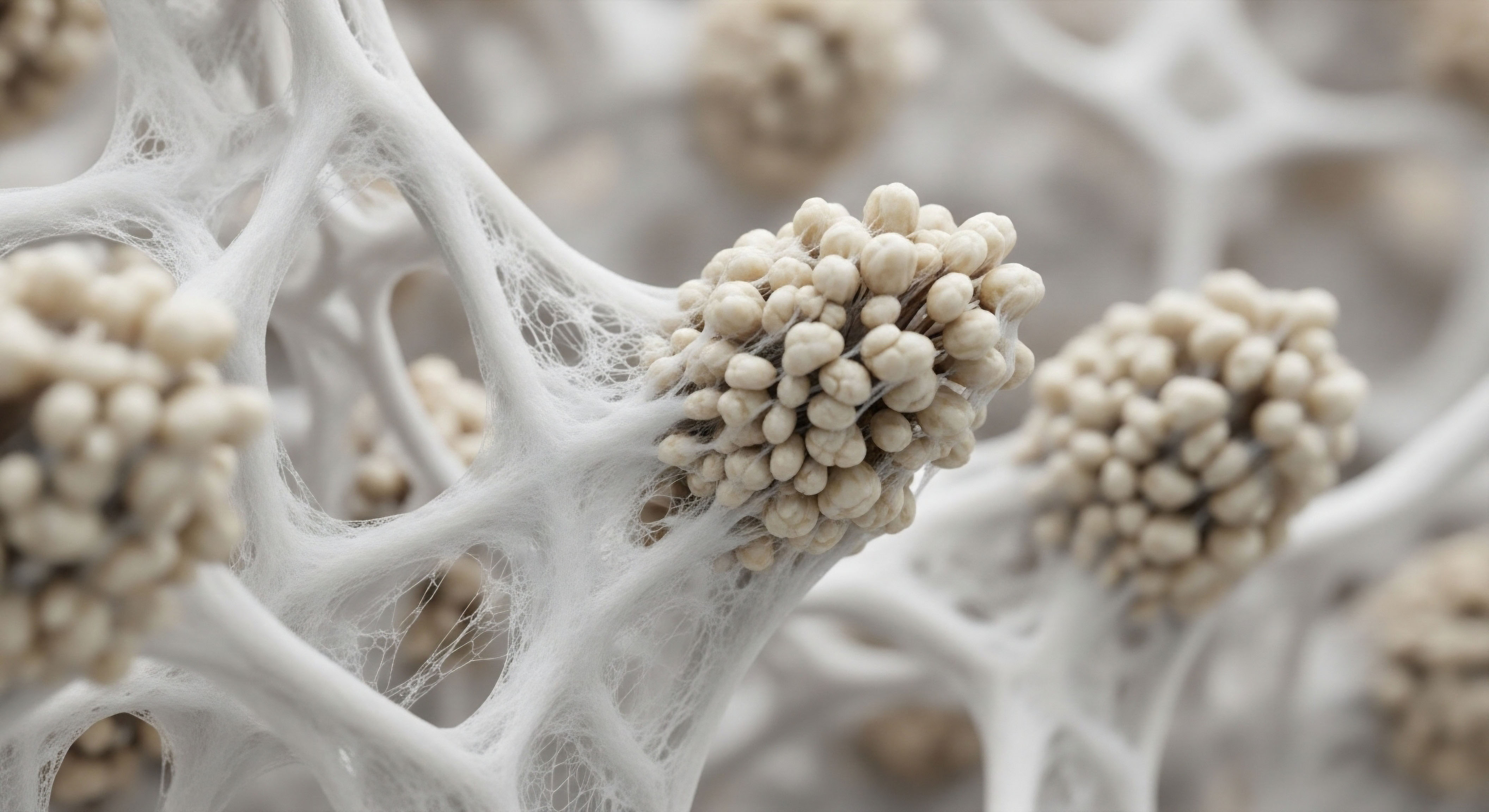

Fundamentals
The sensation is a familiar one for many. It arrives as a subtle haze, a gentle blurring at the edges of thought. Words that were once readily accessible now feel just out of reach. The sharp focus required to manage complex tasks begins to feel diffuse, as if you are trying to see through a constant, low-grade static.
This experience, often labeled as “brain fog,” is a deeply personal and frequently unsettling aspect of cognitive change. Your internal world, once a place of clarity and quick connections, can begin to feel foreign. This is a valid and significant experience, one that points toward a shift in your underlying biological systems.
The architecture of your cognition is profoundly connected to the symphony of your endocrine system, and when a key conductor like testosterone is diminished, the entire performance can be affected.
Testosterone is a steroid hormone that functions as a powerful signaling molecule throughout the body. While it is most widely recognized for its role in male physiology, including the development of secondary sexual characteristics and the maintenance of muscle mass and bone density, its influence extends directly into the central nervous system.
The brain is replete with androgen receptors, which are specialized docking stations on the surface of and within neurons that testosterone can bind to. These receptors are particularly concentrated in brain regions that are critical for higher-order cognitive processes, such as the hippocampus, which is central to memory formation, and the prefrontal cortex, the seat of executive functions like planning and decision-making.
The presence of these receptors signifies that the brain is a primary target organ for testosterone, designed to listen and respond to its signals.

The Biological Basis of Cognitive Symptoms
When circulating levels of testosterone are insufficient, these critical brain regions may not receive the stimulation required for optimal function. This hormonal deficit can manifest as a collection of cognitive symptoms. The feeling of mental fatigue, the difficulty in sustaining concentration during a meeting, or the struggle to recall a specific detail are direct reflections of cellular processes being inadequately supported.
Testosterone crosses the blood-brain barrier, a protective lining that separates the brain from general circulation, allowing it to exert its effects directly on neural tissue. Its actions are multifaceted, contributing to the health and resilience of the neurons themselves.
Unmanaged low testosterone creates a state where the brain’s processing power is handicapped. This is not a failure of intellect or effort. It is a physiological state where the necessary biochemical support for sharp cognition is lacking. Understanding this connection is the first step in moving from a place of concern to a position of informed action. Your cognitive experience is tethered to your hormonal health, and addressing the latter provides a direct pathway to improving the former.
The cognitive haze associated with low testosterone stems from diminished hormonal signaling in key brain regions responsible for memory and focus.
The protective effects of testosterone on the brain are a subject of ongoing and intensive research. Current evidence points to several key neuroprotective roles that this hormone plays, which helps explain the cognitive decline experienced when its levels are suboptimal. These mechanisms are fundamental to appreciating why hormonal balance is integral to long-term brain health and function.
- Neuronal Survival ∞ Testosterone has been shown to delay apoptosis, which is the process of programmed cell death. By promoting the survival of existing neurons, it helps maintain the structural integrity of the brain’s communication networks.
- Nerve Regrowth ∞ Following injury or damage to nerve cells, testosterone appears to support the process of regrowth and repair. This capacity for neural regeneration is vital for maintaining cognitive function over a lifetime.
- Anti-Inflammatory Action ∞ The hormone exerts anti-inflammatory effects within the brain. Chronic inflammation is a known contributor to neurodegeneration and cognitive impairment, and testosterone helps to mitigate these inflammatory pathways.
- Reduction of Oxidative Stress ∞ It can help reduce the damaging effects of oxidative stress, a condition where harmful molecules called free radicals overwhelm the brain’s antioxidant defenses, leading to cellular damage.

How Does Low Testosterone Affect Women Cognitively?
The conversation about testosterone is often centered on men, yet this hormone is equally vital for a woman’s biological function, including her cognitive health. Women produce testosterone in the ovaries and adrenal glands, albeit in smaller quantities than men. This testosterone plays a crucial role in maintaining libido, bone density, muscle mass, and, importantly, mental clarity and mood.
During the transition to perimenopause and menopause, the decline in testosterone, alongside estrogen and progesterone, can contribute significantly to cognitive symptoms. Many women report experiences of memory lapses and brain fog during this time. The physiological mechanism is similar to that in men; the androgen receptors in the hippocampus and prefrontal cortex become less stimulated, affecting the efficiency of these cognitive centers.
Therefore, evaluating testosterone levels is a critical component of a comprehensive approach to managing the cognitive changes that can accompany menopause.
Personalized wellness protocols for women may involve the careful application of low-dose Testosterone Cypionate. This approach is designed to restore circulating levels of this hormone to a range that supports cognitive function, energy, and overall well-being without producing unwanted side effects. When combined with progesterone, as is common in post-menopausal protocols, this biochemical recalibration can provide substantial relief from the cognitive and emotional challenges of hormonal decline, allowing for a restoration of function and vitality.


Intermediate
To comprehend the full spectrum of cognitive side effects from unmanaged low testosterone, one must look beyond a simple list of symptoms and examine the intricate machinery of the body’s master regulatory system. The cognitive deficits that arise are the downstream consequences of a disruption in a finely tuned communication network known as the Hypothalamic-Pituitary-Gonadal (HPG) axis.
This system functions as a continuous feedback loop, governing the production of testosterone. The hypothalamus, a region in the brain, releases Gonadotropin-Releasing Hormone (GnRH). This signal prompts the pituitary gland, also in the brain, to release Luteinizing Hormone (LH) and Follicle-Stimulating Hormone (FSH).
LH then travels through the bloodstream to the gonads (testes in men, ovaries in women), instructing them to produce testosterone. When testosterone levels are sufficient, they send a negative feedback signal back to the hypothalamus and pituitary, telling them to slow down GnRH and LH production. This is the body’s elegant, self-regulating thermostat for hormonal balance.
When this axis becomes dysregulated, either through age-related decline or other physiological stressors, testosterone production falters. The resulting hormonal deficit starves the brain of a critical signaling molecule. The cognitive effects are not uniform; they manifest across several distinct domains of brain function.
Verbal memory, the ability to recall conversations and written information, may weaken. Spatial reasoning, which governs our ability to navigate our environment and understand relationships between objects, can become less acute. Perhaps most impactful on daily life is the impairment of executive function, the suite of mental processes that includes planning, problem-solving, attention regulation, and task switching. The feeling of being easily distracted or overwhelmed by complex projects is a hallmark of compromised executive function tied to low testosterone.

Neuroinflammation and Cellular Stress
A chronic deficit of testosterone promotes a pro-inflammatory state within the central nervous system. Testosterone has natural anti-inflammatory properties, and its absence allows inflammatory molecules called cytokines to proliferate more freely. This low-grade, persistent neuroinflammation can degrade neuronal health and interfere with synaptic transmission, the process by which neurons communicate with each other.
The result is a less efficient brain, where signaling is slower and more prone to error. This inflammatory state is compounded by increased oxidative stress. Testosterone helps bolster the brain’s antioxidant defenses. Without adequate levels, neurons become more vulnerable to damage from reactive oxygen species, which are unstable molecules that are byproducts of normal cellular metabolism.
This dual assault of inflammation and oxidative stress accelerates cellular aging within the brain and is a key mechanism behind the cognitive decline seen in hypogonadism.
Disruption of the HPG axis leads to a testosterone deficit that impairs specific cognitive domains by fostering neuroinflammation and oxidative stress.
Understanding these mechanisms provides a clear rationale for clinical intervention. The goal of hormonal optimization protocols is to restore the biochemical environment that supports robust neurological function. This involves more than simply replacing testosterone; it requires a systemic approach to re-establishing balance within the HPG axis.

Clinical Protocols for Restoring Cognitive Function
For men experiencing the cognitive and physiological symptoms of low testosterone, a standard protocol involves the administration of Testosterone Cypionate, typically through weekly intramuscular injections. This method ensures a stable and predictable level of circulating testosterone, avoiding the peaks and troughs that can occur with other delivery methods. This core treatment is often supplemented with other medications to create a comprehensive and balanced hormonal environment.
Anastrozole, an aromatase inhibitor, is frequently included in male protocols. As testosterone levels rise, the body may attempt to restore balance by converting some of the excess testosterone into estradiol via the enzyme aromatase. While some estrogen is necessary for male health, excessive levels can lead to side effects and undermine some of the benefits of therapy.
Anastrozole blocks this conversion, helping to maintain an optimal testosterone-to-estrogen ratio. To support the body’s own natural production and maintain the health of the HPG axis, Gonadorelin is often prescribed. Gonadorelin is a synthetic form of GnRH that stimulates the pituitary to produce LH, thereby encouraging the testes to continue their own testosterone production. This prevents testicular atrophy and can help preserve fertility, making it a critical component of a well-rounded protocol.
The following table outlines the primary cognitive symptoms associated with low testosterone and connects them to their underlying biological drivers, illustrating the direct link between hormonal status and brain function.
| Cognitive Symptom | Underlying Biological Mechanism | Affected Brain Region(s) |
|---|---|---|
| Brain Fog / Reduced Mental Clarity | Decreased neuronal excitability, increased neuroinflammation, and suboptimal neurotransmitter regulation. | Prefrontal Cortex, Hippocampus |
| Impaired Verbal Memory | Reduced synaptic plasticity and long-term potentiation in memory circuits. Diminished support from Brain-Derived Neurotrophic Factor (BDNF). | Hippocampus, Temporal Lobe |
| Difficulty with Concentration | Dysregulation of the dopamine system in the prefrontal cortex, which governs attention and focus. | Prefrontal Cortex |
| Slower Processing Speed | Reduced efficiency of synaptic transmission and decreased integrity of white matter tracts that connect brain regions. | Whole Brain, particularly Frontal Lobes |
| Decreased Executive Function | Suboptimal function of the prefrontal cortex due to inadequate androgen receptor stimulation and dopamine signaling. | Prefrontal Cortex |


Academic
A molecular-level examination of testosterone’s influence on the brain reveals its profound role as a modulator of neurogenesis, synaptic plasticity, and neurotransmitter systems. The cognitive deficits arising from hypogonadism are a direct result of the withdrawal of this critical trophic support.
Testosterone, acting both directly through androgen receptors (AR) and indirectly through its metabolites, estradiol and dihydrotestosterone (DHT), orchestrates a cascade of events that maintain the structural and functional integrity of the adult brain. The hippocampus and prefrontal cortex, two regions indispensable for learning, memory, and executive control, are particularly dense with ARs, making them highly sensitive to fluctuations in circulating androgen levels.
One of the most significant mechanisms through which testosterone supports cognition is by modulating adult hippocampal neurogenesis. Research has demonstrated that androgens enhance the survival of newly generated neurons in the dentate gyrus of the hippocampus. This process is vital for cognitive flexibility and the formation of new memories.
Testosterone appears to exert this effect, in part, by influencing the expression of key growth factors, most notably Brain-Derived Neurotrophic Factor (BDNF). BDNF is a protein that promotes the survival, differentiation, and growth of neurons. Studies have shown a positive correlation between testosterone levels and BDNF expression in the hippocampus.
By upregulating BDNF, testosterone creates a more supportive environment for new neurons to integrate into existing neural circuits, thereby enhancing the brain’s capacity for learning and adaptation. A decline in testosterone leads to a corresponding drop in BDNF, compromising this neurogenic process and contributing to age-associated memory impairment.

Synaptic Plasticity and the Role of Androgen Receptors
Beyond the birth of new neurons, testosterone is instrumental in refining the connections between existing ones. This process, known as synaptic plasticity, is the cellular basis of learning and memory. Testosterone and its metabolites have been shown to increase the density of dendritic spines on pyramidal neurons in the CA1 region of the hippocampus.
Dendritic spines are small protrusions that receive input from other neurons, and a higher density of these spines is associated with enhanced synaptic communication and cognitive capacity. This structural remodeling is believed to be mediated by both genomic and non-genomic actions of the hormone.
The genomic pathway involves testosterone binding to intracellular ARs, which then translocate to the nucleus to alter gene expression, leading to the synthesis of proteins involved in synaptic structuring, like postsynaptic density protein 95 (PSD95). Concurrently, non-genomic pathways can trigger rapid signaling cascades at the cell membrane, activating kinases like Erk1/2, which further promote synaptic growth and stability. When testosterone is deficient, these pathways are downregulated, leading to a loss of synaptic connections and a measurable decline in cognitive performance.
Testosterone supports cognitive architecture by promoting BDNF-mediated neurogenesis and modulating androgen receptor activity to enhance synaptic plasticity.
The clinical evidence regarding the efficacy of Testosterone Replacement Therapy (TRT) for improving cognition has yielded complex results, likely due to variations in study design, patient populations, and treatment protocols. However, a careful analysis of the literature reveals important patterns. Trials that demonstrate cognitive benefits often involve men with confirmed hypogonadism and baseline cognitive complaints.
For instance, some studies show that TRT can improve spatial memory and verbal memory in this population. The discrepancies in findings across different trials highlight the complexity of the issue. Factors such as the duration of treatment, the dosage used, the route of administration, and whether cognitive impairment was already present at baseline all influence the outcomes. This underscores the necessity of personalized clinical protocols tailored to the individual’s specific biochemistry and symptoms.

What Are the Long Term Neurological Implications?
The long-term neurological consequences of unmanaged low testosterone extend into the realm of neurodegenerative disease. Epidemiological studies have suggested a correlation between low androgen levels in mid-life and an increased risk for developing Alzheimer’s disease later on.
The proposed mechanism involves testosterone’s role in mitigating the accumulation of beta-amyloid plaques, one of the primary pathological hallmarks of Alzheimer’s. Testosterone has been found to reduce the production of beta-amyloid peptides and promote their clearance from the brain.
Its anti-inflammatory and antioxidant properties also help protect neurons from the toxic environment created by the disease process. While TRT is not a cure for Alzheimer’s, maintaining optimal testosterone levels throughout life may be a key strategy in preserving neurological resilience and reducing the risk of age-related cognitive disorders.
The following table summarizes findings from selected research areas investigating the link between testosterone and cognitive function, providing insight into the scientific consensus and areas of ongoing investigation.
| Area of Investigation | Key Findings from Clinical & Preclinical Studies | General Consensus |
|---|---|---|
| TRT and Global Cognition | Results are mixed. Some randomized controlled trials (RCTs) show modest improvements in global cognition, particularly in men with baseline impairment. Others, including large-scale trials, have found no significant effect. | The benefit of TRT on global cognition is not definitively established for all populations; effects may be most pronounced in men with diagnosed hypogonadism and pre-existing cognitive symptoms. |
| Testosterone & Memory | Evidence suggests a stronger link for specific memory domains. Studies have reported improvements in spatial and verbal memory following testosterone administration. | Testosterone appears to play a significant role in memory circuits, particularly those housed in the hippocampus. Therapeutic interventions may offer targeted benefits for memory function. |
| Androgen Receptors & Neuroprotection | Preclinical models show that activation of androgen receptors is neuroprotective, reduces neuronal damage, and supports synaptic health. This effect can occur independently of conversion to estradiol. | The direct action of testosterone on androgen receptors in the brain is a key mechanism for maintaining neuronal integrity and function. |
| Testosterone & BDNF | Testosterone administration has been shown to increase levels of Brain-Derived Neurotrophic Factor (BDNF) in the brain, which is crucial for neuronal survival and neurogenesis. | A primary pathway through which testosterone supports brain health is by promoting a neurotrophic environment, with BDNF as a key mediator. |

References
- Cherrier, Monique M. et al. “Testosterone treatment and cognitive function in older men with low testosterone and age-associated memory impairment.” JAMA, vol. 317, no. 7, 2017, pp. 717-727.
- Grigorova, M. et al. “Testosterone supplementation and cognitive functioning in men ∞ a systematic review and meta-analysis.” The Journal of Clinical Endocrinology & Metabolism, vol. 104, no. 10, 2019, pp. 4587-4598.
- Jarabek, I. et al. “On the effects of testosterone on brain behavioral functions.” Frontiers in Endocrinology, vol. 5, 2014, p. 12.
- Kritzer, Mary F. “Androgen Influence on Prefrontal Dopamine Systems in Adult Male Rats ∞ Localization of Cognate Intracellular Receptors in Medial Prefrontal Projections to the Ventral Tegmental Area and Effects of Gonadectomy and Hormone Replacement on Glutamate-Stimulated Extracellular Dopamine Level.” Cerebral Cortex, vol. 22, no. 5, 2012, pp. 1143-54.
- MacLusky, N. J. et al. “Androgen modulation of hippocampal structure and function.” Neuroscience, vol. 299, 2015, pp. 1-13.
- Resnick, Susan M. et al. “Testosterone Treatment and Cognitive Function in Older Men With Low Testosterone and Age-Associated Memory Impairment.” JAMA, vol. 317, no. 7, 2017, pp. 717-727.
- Spritzer, Mark D. and Liisa A.M. Galea. “Testosterone and adult neurogenesis.” Hippocampus, vol. 17, no. 11, 2007, pp. 1029-41.
- Tirassa, P. et al. “Testosterone, and its metabolite dihydrotestosterone, enhances nerve growth factor-induced neurite outgrowth in PC12 cells.” Journal of Neuroscience Research, vol. 50, no. 4, 1997, pp. 549-56.
- Hampson, Elizabeth, and Sherry A. King. “Androgens and the developing hippocampus.” Frontiers in Neuroendocrinology, vol. 57, 2020, p. 100833.
- Li, Y. et al. “Testosterone reduces hippocampal synaptic damage in an androgen receptor-independent manner in Tfm male mice.” Journal of Endocrinology, vol. 260, no. 1, 2024.

Reflection
The information presented here provides a map of the biological territory connecting your hormonal health to your cognitive vitality. It translates the subjective experience of mental fog and memory concerns into a clear narrative of cellular and systemic function. This knowledge is the foundational step.
It shifts the perspective from one of passive concern to one of active understanding. Your personal health narrative is unique, written in the language of your own biochemistry and life experiences. The path forward involves a personalized approach, one that begins with a comprehensive assessment of your individual hormonal landscape.
The ultimate goal is the restoration of your biological systems to their optimal state, allowing you to reclaim a sense of clarity, focus, and function that feels authentic to you. This journey is about recalibrating your internal environment to fully support the life you wish to lead.

Glossary

brain fog

androgen receptors

prefrontal cortex

cognitive symptoms

brain regions

low testosterone

cognitive decline

cognitive function

oxidative stress

hippocampus

testosterone levels

testosterone cypionate

executive function

verbal memory

neuroinflammation

hypogonadism

hpg axis

anastrozole

gonadorelin

synaptic plasticity

neurogenesis

through which testosterone supports

brain-derived neurotrophic factor

age-associated memory impairment




